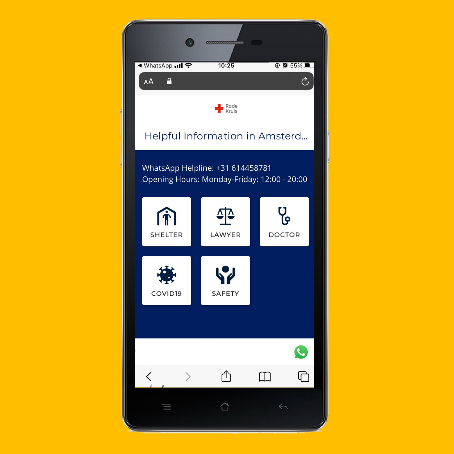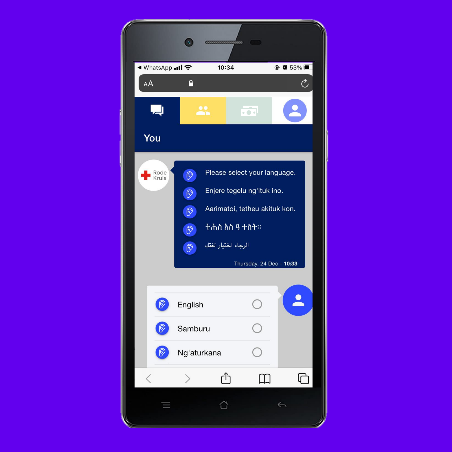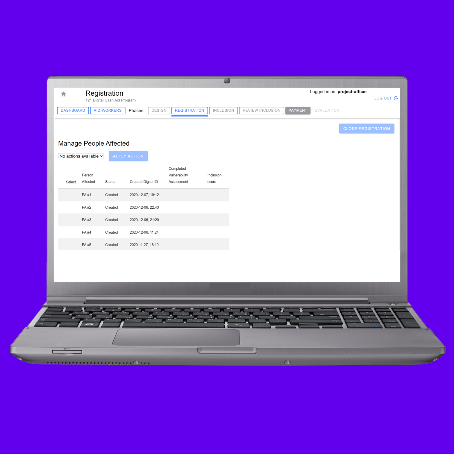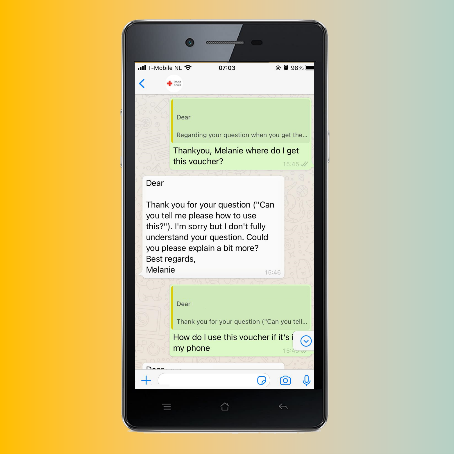Written by Sander Houston
The world is witnessing record levels of migration and displacement, posing some of the most significant humanitarian challenges of modern time. Across the globe, people who migrate or are displaced from their homes face unacceptable risks and too often are deprived of the basic needs and protection they need to ensure their safety, dignity, and rights. Worldwide there are 70.8 million migrants that are involuntarily displaced. This challenge also applies to the Netherlands. There is a need for shelter and an information shortage on where to get the right help (such as access to food and healthcare). COVID now poses an additional challenge for this group. In response to this challenge, The Netherlands Red Cross created a program that combines access to helpful information and cash-based aid.
Digital technology has the potential to transform how programs operate. Data management and digital payment platforms are already demonstrating how new technologies can have a great impact on convenience for people receiving cash assistance and also efficiencies, including for the aid organization. 121 is a platform built on the knowledge and skill of a consortium of humanitarian, technical, and academic partners across numerous locations. The 121 platform consists of three easy-to-use Cash-Based Aid products for people affected, such as undocumented migrants, and aid workers alike in response to the increasing global demand for cash and voucher-based aid in the humanitarian sector.
This blog shares insights from the 121 pilot in The Netherlands that took place from November 1st 2020 until May 31st 2021
The pilot
Anne van Berkel (Project Leader of The Netherlands Red Cross) explains how the pilot addresses both the need for information as the need for food: ‘the pilot can be divided into three pillars: The Helpful Information, Cash Aid and the WhatsApp Helpdesk. Learnings from earlier contact and co-designs with undocumented migrants pointed to the need for Cash help. This is where 121 came in’.
The pilot consists of weekly Digital Cash Vouchers send via WhatsApp, the WhatsApp Helpdesk, and the Helpful Information website. These products were piloted in Amsterdam and Utrecht, with undocumented migrants who were further under pressure due to the COVID crisis. . This program distributes weekly digital supermarket vouchers (Digital Cash Vouchers) to a selected group of undocumented migrants. These undocumented migrants are part of the Netherlands Red Cross Food Program (a COVID-related food aid program) or on the waiting list of the Dutch LVV-regulation. The LVV-regulation is a trial of the Dutch government, in which five municipalities, and other organizations provide shelter and counseling to undocumented migrants. The person receives the supervoucher through Whatsapp and can use it to pay in the supermarket, without printing and also offline. In addition to the Digital Cash Vouchers, the pilot offered information/referral about shelter, medical assistance, legal advice, and COVID for undocumented migrants in the Netherlands, through a public website.
The purpose of the pilot is to promote the physical and mental well-being of undocumented migrants by reducing uncertainty and stress about daily survival. The pilot was supported by the Philips Foundation which has also been involved in an earlier stage of the development of the 121.
The vouchers and Helpful Information allow for initial contact with undocumented migrants. The helpdesk then helps continue relationships with undocumented migrants. The feedback that is received in the helpdesk can then be used to improve the overall process by using this to generate a feedback loop.
Someone that knows what it’s like to be an undocumented migrant for a while is John. He knows from experience how urgent the need for this innovative emergency aid is and how important it is that it is designed from the user’s perspective. That was his motivation to help as someone with practical knowledge of the issue in the creation of the Helpful Information Web App. “From the moment the Immigration and Naturalization Service rejected my asylum application, I was on the street. I went to Amsterdam, where I was able to stay reasonably under the radar of the authorities. I heard from the asylum seekers center that after a rejection you can knock on the door of a number of places for food or shelter. But where exactly, how and which? It was maddening. How can you seek help from authorities if you are just trying to hide from the authorities? I became depressed, anxious and very lonely. This aid package from the Red Cross makes a huge difference when you’re on the street. I wish others who are in temporary need that they can also increase their chances of survival via Helpful Information, the WhatsApp Helpdesk or the vouchers.”
Digital Community engagement and accountability (CEA) is an approach to Red Cross Red Crescent programming and operations. It is supported by a set of activities that help put communities at the center of what they do, by integrating communication and participation throughout the program cycle or operation. When asked what role Digital CEA plays in this pilot Jonath Lijftogt (Coordinator & Digital Community Engagement & Accountability at 510) said: ‘The pilot is a way of having direct and sustainable contact with undocumented migrants. That’s the essence of Community Engagement and Accountability’.
Helpful Information Web App
‘There is already a lot of help available in The Netherlands but it’s not always easy to find it. The Helpful Information Web App offers a solution.’ says Van Berkel. The Helpful Information Web App is an information source for undocumented migrants with available help in the Netherlands. The Web App is available to everyone and the current information spans shelter, medical assistance, legal advice, and COVID-19. When building an app it is important to center it around the user. The Web App is a direct result of co-designing and user testing with undocumented migrants whose knowledge and experience designed this Web App. Human Centered Design methodologies and the uptake demonstrates the importance of involving the human stakeholder’s perspective in all steps of the product creation process. When Orla Canavan (Strategic Product Designer lead at 510) was asked why 510 uses Human Centered Design she said: ‘In 510 it’s easy to come up with a technical solution and assume it will work for the end user. Most all of us in this team have never experienced what it’s like to access information on a broken smartphone, with limited battery, leaning by a building to catch Wi-Fi at 8 o’clock at night just to find somewhere to sleep. These are the things we learn and adapt technology towards when we use Human Centered Design. We can’t solve everything with technology but we can at least make sure that when we do offer technology it’s at least useable.’
Read more on Human Centered Design here.

Helpful Information Web App
121 platform
With the 121 platform, The Netherlands Red Cross and 510 aim to make Cash-Based Aid safe, fast, and fair, and to help people affected, by disasters (such as hurricanes, floods, drought, epidemics, and conflict) meet their own needs. 510 Co-designs with People Affected by disasters and Aid Workers and uses robust and available technology to create the solutions needed. Van Berkel adds by saying: ‘it’s a platform that allows us to easily reach and work together with vulnerable people. It optimizes the process of aid assistance by creating a feedback loop and it has the potential to adapt to different types of help’. Melanie Miltenburg (510 coordinator of the pilot) adds by saying: ‘the platform enables us to quickly scale up the number of people we support, with more or less the same capacity from our side. That’s of course a very important feature for emergency aid.’
The Self Registration App, the HO Portal, and the Digital Cash Voucher
The 121 platform, in this pilot, has two interfaces (that have been built in-house in consortium with various partner): the Self Registration app and the Humanitarian Organization (HO) Portal. In the Self Registration App, undocumented migrants can register for programs. In the HO Portal organizations, such as The Netherlands Red Cross, can manage the program from registration through the sending out payments such as digital supermarket vouchers or Mpesa. This platform can facilitate registration, validation, inclusion, and payment in a cash and voucher program.
The Self Registration App was co-designed with people affected by disasters around the world, asking them about their experience of before, during and after receiving aid.
Read more here.
The HO Portal was co-designed with aid workers responding to these disasters.
Read more here.
Both applications were co-designed to ensure the end users’ digital knowledge and preferences were taken into account and when needed training and assistance was given.
Read more about how the Self Registration App was used in Kenya here.


The Self Registration App The HO Portal
WhatsApp Helpdesk
The WhatsApp Helpdesk is developed for People Affected to understand more about the aid they applied for, or to let us know if they face any problem with e.g. the registration process or receiving the voucher. They can also approach the Helpdesk for other topics, such as to learn where to find shelter, medical care or legal support, or even where to find a language training. The Helpdesk improves the connection with Aid Workers who can help with questions they might have. ‘The WhatsApp Helpdesk ties the program together’, says Miltenburg. She continues by saying: ‘It’s surprising, and contradicting my own initial expectations, how personal digital communication can be. From the messages we get, you can read that people feel it as a personal conversation, and let go of shame or other barriers to share their concerns. Moreover, it is the person him/herself that decides if and when to contact us, not depending on when we contact them for feedback, as in traditional projects’.
As the Helpdesk is available 7 days/week, it provides People Affected quickly and gives easy access to the Humanitarian Organization. In addition, the questions and feedback received through the Helpdesk provide the Humanitarian Organization valuable insights in the context, needs and constraints of the Person Affected, which can be used to further develop the services/products.

WhatsApp Helpdesk
Organizations involved
The 121 platform is built on the knowledge and skills of a consortium of humanitarian, technical and academic partners across numerous locations.
Read more about the consortium here.
The 121 platform was piloted in The Netherlands with undocumented migrants. This is a group that, due to their situation, typically prefers to stay under the radar and therefore is often hard to reach. Partner organizations that specifically support this group brought The Netherlands Red Cross in contact with this group. The following list consists out of the partner organizations that were involved during this pilot and will expand in the future as the program develops: Loket Ongedocumenteerden Amsterdam (LOA), Aanmeldloket Utrecht, STIL Utrecht, Filipino LGBT Europe (Amsterdam), and Stap Verder (Amsterdam).
510’s role
510 supported The Netherlands Red Cross domestic department in providing food aid to undocumented migrants by co-designing and implementing the 121 platform. This enables undocumented migrants and other people affected to efficiently and safely register themselves to apply for food aid. The 121 platform enables sending digital vouchers through WhatsApp. It also enables aid workers and humanitarian organizations to manage and coordinate cash and voucher programs. The system, after registration, helps humanitarian organizations in making sure that the right people are part of the programs and keeps these people updated throughout the process. Lars Stevens, Project coordinator of 121 at 510, explains the benefit of this system for humanitarian organizations by saying: ‘Reducing uncertainty and creating clarity is one of the main goals for humanitarian organizations in helping people.’ These updates occur every week. The system is also able to monitor the usage of the vouchers and creating a clear overview of whether vouchers were properly received and (fully) used. The digital system allowed for the program to be scaled up a lot quicker while the capacity of the humanitarian organization stayed relatively the same. This is a huge benefit of the digital system: ‘Effectively, by a few pushes of a button people receive digital vouchers which they can use in the supermarket to buy groceries’ concludes Lars Stevens.
Main findings
- The help offered (voucher, helpful information, helpdesk) helps people reduce stress on their daily life through consistent structure and autonomy which contributes to better mental and physical health.
- The digital process of registration, receipt and use of the voucher is more flexible and convenient for undocumented migrants, as it is not reliant on a certain time and location. Moreover, the process is fully anonymous. This contributes to the feeling of dignity.
- The person knows to find the Whatsapp Helpdesk when in need or having a question. The Whatsapp Helpdesk is very accessible and quick, and reduces cultural or practical barriers to reach out for help.
- The Helpful Information Web App is frequently visited to find out where to go for specific needs, but also allows the Red Cross to share information as per upcoming needs (e.g: COVID vaccination opportunity for undocumented migrants has been updated daily on this website.
- Using Digital Aid has allowed for The Netherlands Red Cross to quickly scale up the program as new needs arise.
How we measure main findings
We measured the main findings both in an quantitative and qualitative way. From a quantitative point we collected data through the registration system, Helpful Information App (clicks), and Helpdesk (log sheet). For qualitative measurements we elicited feedback from undocumented migrants in the program by sending them an online survey and by conducting interviews . We also conducted interviews with the partner organizations involved . ‘Relevant information about individuals and communities in need can help provide effective and personalized humanitarian aid.’ says Joachim Ramakers (Policy Advisor Data Responsibility at 510). He continues by saying: ‘Our data responsibility policy addresses the responsible processing of data concerning ethical standards and in principles in the humanitarian context, bearing in mind potential consequences and taking measures to avoid putting individuals or communities at risk.’
Read more on our data responsibility policy here.
Next steps
The next phase of the program will include drawing up an action plan that includes the planning, a detailed budget, and steps for fundraising. A phased transfer will include training and the writing of manuals. 121 is currently officially launched in The Netherlands.
Read more about the latest plans for 121 and the worldwide pilots linked to it here.

Simplified user journey